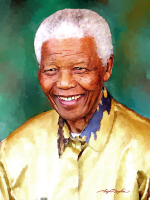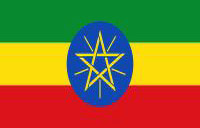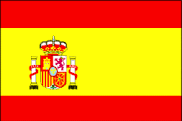
Nelson Mandela
The Nobel Peace Prize 1993
Co-Nobelist F.W. de Klerk
Award: "for work regarding peaceful termination of apartheid regime and for laying the foundations for a new democratic South Africa."
Nelson Mandela's Nobel co-recipient was President Frederik Willem de Klerk who released him from prison. They had agreed to transitioning to majority rule peacefully.
"It always seems impossible until it's done."
Nelson Mandela – A Journey to Balanced Leadership
Victoria Barrientos, BA (English), Summa Cum Laude, Content Writer
July 21, 2024
Leading with a balanced heart and mind is not a simple feat. Some may lead with an emotional pull and others with a firm intellect. Nelson Mandela, a pivotal icon for dismantling the apartheid regime, exuded a balanced leadership style by leading with intellectual and heartfelt stances. His emotional intelligence stemmed from his community-centered upbringing which excelled as he fought for unity through his life of persecution and redemption. Yet he also persevered in his astuteness by achieving his law education and career. Nelson Mandela's emotional and intellectual intelligence expertise intensified in his most pivotal two decades when he was imprisoned. But through it all Mandela's willingness to self-sacrifice for the greater good exemplified his commitment to his vision for a democratic and multiracial nation.
Nelson Mandela's childhood was an influential period that inevitably translated into his personality and leadership style. He was born on July 18th, 1918 in Mvezo, South Africa where his father was a local chief of the Xhosa people.1 Nelson Mandela's original first name Rolihlahla roughly translates to troublemaker.2 This auspicious name foreshadowed a destined identity and trait needed to restructure South Africa's political state. Although his father passed away, royalty did not fade from his life as he was then taken under guardianship by Jongintaba Dalindyebo, regent of the Thembu people.3 Mandela's exposure to leadership from his father's chieftaincy and Dalindyebo's leadership, as well as his participation in tribal meetings, influenced his style of balance and fairness.
In Xhosa culture, a philosophy called Ubuntu is an important concept which influenced a democratic style of leadership in the Xhosa nation. According to Clair Oppenheim’s "Nelson and the Power of Ubuntu", the notion translates to "A person is a person through other persons" or "I am because we are."4 Such statements reveal that Xhosa's beliefs held a lack of emphasis on extreme individualism and instead held space for community members to prioritize interconnectedness. They believe they are stronger together than as individuals as everyone's actions affect others. Through these beliefs, the leadership of their nation held a deep importance. Leadership duties needed to include maintaining growth and harmony. For example, Mandela witnessed Thembu people's tribal meetings which exuded democratic cooperation. The meetings were never held on a fixed schedule but were held when a situation needed to be addressed and handled together as a community.5 An important observation by Mandela was the opportunity every person in the community received to express their opinions. The regent always sat in silence and receptiveness to his community members' words.6 This fair conduct of respect and inclusivity grew to be a part of Mandela's character in the midst of the hardship he had experienced in adult life.
A part of Mandela practicing inclusivity included enhancing his understanding of inclusivity in all black South African and multiracial peers. Although Mandela had always been a proud Xhosa, he had not experienced an opportunity to understand the similarities the Xhosa shared with other tribes. His first exploration of black South Africans of other nations was in Healdtown College where he learned the beauty of black South Africans as a whole community instead of as separate tribes. He first practiced his solidarity for all black South Africans when he declined to serve in the College of Forte Hare's government body.7 Doing so would be against his morals since it did not have a fair inclusion of black representatives. This decision resulted in expulsion which he willingly accepted.8 His unwavering loyalty presents how his Xhosa pride transformed into African pride.
Mandela made his first white friend when he was a law firm clerk. Nat Bregman, also a law clerk, introduced Mandela to communism which shared Mandela's values of equality. Their friendship consisted of many lectures and community party meetings where they continued to bond over intellectual interests.9 Such gatherings were another pivotal transition in Mandela's journey where he was introduced to diverse groups of similar-minded people. Being in a room with whites, Africans, Indians and colored South Africans taught him that there was room for black Africans in empowered spaces. Such experiences also introduced Mandela to a multiracial union. Mandela's successful start as a law attorney led him to join the African National Congress [ANC]. This was a meticulous choice because he respected it being an inclusive organization for all black South Africans. The ANC phase of Mandela's life presents a passionate and radical side of his leadership style amidst the chaos that apartheid would bring. After the 1948 Apartheid regime, there was ultimately a two tier society of the white minority above the black majority.10 Through a pushback of protests and demonstrations, Mandela and congress members were arrested for treason by inciting revolution against the govt.11
Mandela's fight for awareness persisted as he secretly traveled around the nation to spread the ideals of the ANC by pretending to be a hired driver, giving himself the nickname "The Black Pimpernel" (based on a novel character that lived a double life).12 This effort revealed his creative determination and fearlessness towards revolutionizing a nation. Mandela's persistent spirit was also in full effect during this time since attempts to ban the ANC were constant.13 However, his tenacity prepared him to usher through more militant methods of protest. The ANC was split between following the nonviolent methods of Gandhi while Mandela and other members concluded that armed struggle would be the successful path toward improvement. Thus, in 1961, they created Spear of the Nation which executed attacks on the South African Government.14 Although Mandela originally favored resolving issues equitably, this other method shows his willingness to take large risks.
As leader of Spear of the Nation, Mandela campaigned for a sustained guerrilla war similar to the ones executed by other South African countries.15 However, it did not transpire as he was arrested again in 1962 for fear that his efforts would pull South Africa into the Soviet Communist camp.16 From the dock, the trial for his arrest resulted in one of Mandela’s most famous political speeches, "I Am Prepared to Die". This speech is about his ideal of equality, in pursuit of which he was prepared to die.17 Mandela's four-hour speech asserted his unapologetic devotion to the ANC and defended its policies. He detailed the disproportional quality of life between black and white South Africans. The final words of his speech are distinctly memorable:
"During my lifetime, I have dedicated myself to this struggle of the African people. I have fought against white domination and I have fought against black domination. I have cherished the ideal of a democratic and free society in which all persons live together in harmony and with equal opportunities. It is an ideal which I hope to live for and to achieve. If need be, it is an ideal for which I am prepared to die."18
Mandela's point on fighting against white domination and black domination demonstrates his understanding of letting go of biases to invite a truly united nation. His ideals of a free society have been instilled within him by his cultural beliefs of Ubuntu and his further integration with other races in adult life. However, his statement that he is willing to die for these ideals proved to be true during his arduous journey in prison.
Mandela and fellow ANC members were sent to Robben Island where they settled in strong and fearless, nightly singing freedom songs.19 Yet, Mandela soon realized that his radical tendencies had to subside to foster a unified ideal; even if it had to be with the white warders who, upon him, frowned. He was forced into hard labor, harsh living conditions and no medical care.20 Mandela's eyesight eventually became permanently damaged from not receiving eye protection while working under the sun.21 Despite that, Mandela stayed true to his character and encouraged his cellmates to befriend the warders. They began with showing respect to the warders who, to them, were respectful. They loaned to the warders their jackets on which to sit.22 Their attempts at sharing and cooperating resembled a social experiment done to soften the cold exterior of the Afrikaans. More importantly, it was the beginning step in spreading Ubuntu. Successfully the warden's and cellmates' understanding of each other grew to the point of cellmates being treated humanely by being provided better uniforms, games and granted social time.23 A key moment that proved to Mandela that his leadership style of inclusivity was valuable was a formal goodbye from Colonel Badenhorst who wished him and “his people” good luck.24 It taught Mandela that no human is innately coldhearted but that he can be conditioned as such. He recounted his reaction, "It was a useful reminder that all men, even the most seemingly cold-blooded, have a core of human decency, and that if their heart is touched, they are capable of changing".25
Ubuntu was not the only form of change he ushered in prison. He also managed to assist in change outside of prison. He maintained determination toward his goal of social freedom for black South Africans by continuing his legal studies, organizing hunger strikes for fellow political prisoners and reading.26 In 1985 Mandela was offered a chance for release on the condition that he reject violence as a political instrument. However, his morals pulled through once again as he rejected the assumption that he and black Africans were aggressors when they as a whole were "imprisoned."27 He remained in prison engaging in private meetings with a board of officials about the ANC’s genuine intentions and its inclusive dedication to minority and majority South African communities.28 In 1989 President de Klerk announced the release of the Robben Island inmates after Mandela met with the national party to promote peace within South Africa.29 Through this successful outcome, Mandela proved that respectful communication can result in clarity and reconciliation. His efforts to assist in a revolution, while imprisoned, revealed how much his selfless nature intensified.
Mandela's release was delayed until 1990 because he needed to prepare with ANC members for his release.30 His humble exit, where he insisted on thanking those who looked after him and greeting the people of Cape Town after walking exiting the gates, further highlights his dedication to humility and unity. A standout statement in his speech shows he harbored humble beliefs about his identity and purpose, "I stand here before you not as a prophet but as a humble servant of you, the people."31 Post-prison revealed a promising future for Mandela and the ANC. His transformation to an inclusive leader is evident as he was awarded the 1993 Nobel Peace Prize along with President de Klerk for their joint effort to end apartheid.32 The ANC rose in leadership to win 62.6 percent of the 1994 South African election. Mandela's joy in winning a little over half of the votes revealed his true desire for a balanced constitution, "Had we won two-thirds of the vote and been able to write a constitution unfettered by input from others, people would argue that we had created an ANC constitution, not a South African constitution. I wanted a true government of national unity."33 His balanced view of that which would be a biased national assembly versus a balanced South African Assembly proved his unwavering vision for a united South Africa.
To get to this successful point as a leader and bringer of change, Mandela had to endure his own transformation. In his 2000 interview with Oprah Winfrey, he stated, "In my younger days, I was arrogant - jail helped me to get rid of it. I did nothing but make enemies because of my arrogance."34 His journey from radical activism to a peaceful approach, his intellectual growth and his expansion for forgiveness and reconciliation exemplified his leadership qualities. Mandela's time in prison was a profound act of self-sacrifice, but he used this period to re-empower himself and the wardens through unity. Mandela also shared with Winfrey, "A good leader can engage in a debate frankly and thoroughly, knowing that at the end he and the other side must be closer, and thus emerge stronger."35 His ability to unite people from diverse backgrounds, and belief systems coupled with his commitment to justice and equality, allowed him to lead South Africa through one of its most turbulent periods. Nelson Mandela's legacy continues to inspire and guide future generations, demonstrating that true leadership lies in a balanced head and heart.
Notes
- The People Profiles, “Nelson Mandela & Apartheid in South Africa Documentary,” March 10, 2023, https://www.youtube.com/watch?v=3_ziO1gFOsQ, 0:00:07.
- The People Profiles, “Nelson Mandela & Apartheid in South Africa Documentary,” March 10, 2023. 0:00:22.
- Claire E. Oppenheim, “Nelson Mandela and the Power of Ubuntu,” Religions 3, no. 2 (April 26, 2012): 369–88, https://doi.org/10.3390/rel3020369, 373.
- Oppenheim, “Nelson Mandela and the Power of Ubuntu,” April 26, 2012. 369.
- Oppenheim, “Nelson Mandela and the Power of Ubuntu,” April 26, 2012. 373
- Oppenheim, “Nelson Mandela and the Power of Ubuntu,” April 26, 2012. 373.
- Oppenheim, “Nelson Mandela and the Power of Ubuntu,” April 26, 2012. 375.
- Oppenheim, “Nelson Mandela and the Power of Ubuntu,” April 26, 2012. 375.
- Oppenheim, “Nelson Mandela and the Power of Ubuntu,” April 26, 2012. 377.
- The People Profiles, “Nelson Mandela & Apartheid in South Africa Documentary,” March 10, 2023.00:11:30.
- The People Profiles, “Nelson Mandela & Apartheid in South Africa Documentary,” March 10, 2023.00:17:23.
- The People Profiles, “Nelson Mandela & Apartheid in South Africa Documentary,” March 10, 2023.00:19:00.
- Oppenheim, “Nelson Mandela and the Power of Ubuntu,” April 26, 2012. 378.
- The People Profiles, “Nelson Mandela & Apartheid in South Africa Documentary,” March 10, 2023. 00:23:50.
- The People Profiles, “Nelson Mandela & Apartheid in South Africa Documentary,” March 10, 2023. 00:24:21.
- The People Profiles, “Nelson Mandela & Apartheid in South Africa Documentary,” March 10, 2023. 00:25:00.
- The People Profiles, “Nelson Mandela & Apartheid in South Africa Documentary,” March 10, 2023. 00:26:27.
- Nelson Mandela Foundation, “‘I Am Prepared to Die’ – Nelson Mandela Foundation,” n.d., https://www.nelsonmandela.org/news/entry/i-am-prepared-to-die.
- Oppenheim, “Nelson Mandela and the Power of Ubuntu,” April 26, 2012. 381
- LThe People Profiles, “Nelson Mandela & Apartheid in South Africa Documentary,” March 10, 2023. 00:28:00.
- The People Profiles, “Nelson Mandela & Apartheid in South Africa Documentary,” March 10, 2023. 00:27:56.
- Oppenheim, “Nelson Mandela and the Power of Ubuntu,” April 26, 2012. 382.
- Oppenheim, “Nelson Mandela and the Power of Ubuntu,” April 26, 2012, 383.
- Oppenheim, “Nelson Mandela and the Power of Ubuntu,” April 26, 2012. 383.
- Oppenheim, “Nelson Mandela and the Power of Ubuntu,” April 26, 2012. 383.
- The People Profiles, “Nelson Mandela & Apartheid in South Africa Documentary,” March 10, 2023. 31:00.
- Oppenheim, “Nelson Mandela and the Power of Ubuntu,” April 26, 2012. 384.
- Oppenheim, “Nelson Mandela and the Power of Ubuntu,” April 26, 2012. 384.
- Oppenheim, “Nelson Mandela and the Power of Ubuntu,” April 26, 2012. 385.
- The People Profiles, “Nelson Mandela & Apartheid in South Africa Documentary,” March 10, 2023. 37:19.
- Oppenheim, “Nelson Mandela and the Power of Ubuntu,” April 26, 2012. 386.
- The People Profiles, “Nelson Mandela & Apartheid in South Africa Documentary,” March 10, 2023. 39:40.
- Oppenheim, “Nelson Mandela and the Power of Ubuntu,” April 26, 2012. 386
- “Oprah Interviews Nelson Mandela,” Oprah.com, December 5, 2013, https://www.oprah.com/omagazine/oprah-interviews-nelson-mandela/2.
- “Oprah Interviews Nelson Mandela.”
Bibliography
Nelson Mandela Foundation. n.d. “‘I Am Prepared to Die’ – Nelson Mandela Foundation.” https://www.nelsonmandela.org/news/entry/i-am-prepared-to-die.
Oppenheim, Claire E. “Nelson Mandela and the Power of Ubuntu.” Religions 3, no. 2 (April 26, 2012): 369–88. https://doi.org/10.3390/rel3020369.
Oprah.com. “Oprah Interviews Nelson Mandela,” December 5, 2013. https://www.oprah.com/omagazine/oprah-interviews-nelson-mandela/2.
The People Profiles. “Nelson Mandela & Apartheid in South Africa Documentary,” March 10, 2023. https://www.youtube.com/watch?v=3_ziO1gFOsQ.
Discover Your Abilities and Aspirations!
 $10 $25 $50 $100 Other
$10 $25 $50 $100 Other
Tax Exempt 501(c)3 Non-Profit Organization
Any Currency
“…the peace that is found in libraries and laboratories…” - Louis Pasteur
Copyright © 2023 Ganga Library Inc. All Rights reserved.;

Photo South Africa The Good News, Wikimedia Commons. Painting Tim Tompkins PaintHistory.com
Name: Nelson Rolihlahla Mandela
Birth: 18 July 1918, Qunu, South Africa
Death: 5 December 2013, Johannesburg, South Africa
Residence at the time of the award: South Africa
Prize Motivation: "for their work for the peaceful termination of the apartheid regime, and for laying the foundations for a new democratic South Africa."
Education: Universities of Fort Hare, London, South Africa & Witwatersrand
Portion of Cash: 1/2

Nobel Prize and Charity
Founder
Humor/Quotations
Mandela Essay













